-
Content count
1,394 -
Joined
-
Last visited
-
Days Won
7
Posts posted by Sir Darius the Clairvoyent
-
-
12 minutes ago, Apech said:Funds? Do you mean finds?
Yes, Ill edit it now : )
-
In this spesific case, it is about an alternative form of "punishment" to prison, where people get help getting their economy in order, learn skills, develop a network etc. Problem is, it is hard nut to crack, to attract people with capital without being able to offer them an return on investment.
-
-
(This will not be completely PC, but I’ll back up the more sensitive issues with references)
The standard narrativeHumans left Africa around 80-60k years ago. Nothing much happened until agriculture developed 9-6k years ago, culminating with the first civilization: Sumer. Agriculture then, suppousedly developed independently in the America’s, Indus Valley and China as well (and a few possible other candidates. Humans didn’t move around much, but tech and culture spread primarily through trade. People willingly adopted agriculture as it was somehow superior to a hunter gatherer lifestyle, and then then the ball just kept rolling: and here we are, peak civ and high art:
(A little bit of a straw man, but in essence, I believe there is some truth to it).
Reconsidering the past of our spieces
During the 1800s, Homo sapiens were belived to be around 10.000-20.000 years old. During the middle of the 20th century, this got pushed back to ca. 50.000 years, due to the discovery of cro magnons and Neanderthals. At this point, humans were belived to have evolved primarily or exclusively in Europe. From between the 60s-80s, this got pushed back to 130.000 - 200.000 years ago, based on some archeological and genetic evidence, and this time we our ancestral home got put to east africa, Ethiopia in particular. Finds such as Jerbel Irhound, pushed this even further back, this time 300.000 years in Marocco.
Humans suppousedly left Africa about 60.000 years ago. Scholars such as David Reich, no believe that there has been multiple migrations both out and in of Africa. One piece of evidence supporting this, is that Homo sapiens Ydna replaced the Neanderthal one, at least 100.000 years ago (1).
Further more, we know that humans lived all over eurasia for at least a million years. In addition to this, we keep discovering new spieces: denisovians, homo florencis, naledi and so on (2). There have also been fascinating evidence suggesting humans might have lived in the America’s as far back as 120.000 years ago (3).
Allthough consensus remains that human evolution mostly took part in Africa, this has become way more nuanced over the last few years, and Eurasia has increasingly been seen as a major player in human evolution. Instead of looking at human evolution as a tree, we should view it more of a weave. The most obvious proof of this is the fact that all non Africans carry 2-4% Neanderthal dna. According to Reich, the number of Neanderthal ancestors might be as high as 10-20% (note: percentage of ancestors ≠ amount of dna). We also know that some populations carry dna from speicies so far unknown (ghost populations).
«According to a study published in 2020, there are indications that 2% to 19% (or about ≃6.6 and ≃7.0%) of the DNA of four West African populations may have come from an unknown archaic hominin which split from the ancestor of Sapiens (Modern Humans) and Neanderthals between 360 kya to 1.02 mya.» (4)
The cognitive revolution, if it indeed is real, didn’t take place until 40.000 years ago.
Population replacements - tech, culture and language traveled primarily with people, not trough trade
I’ll stick to Europe as it’s what I am most familiar with, but believe me, there is plenty of material.
400.000-40.000 yo neanderthals45.000-40.000 yo anatomical modern humans
40.000-26.000 yo aurognacians
30.000 - 20.000 yo gravettians
20.000 yo - 10.000 yo western hunter gatherers
10.000-5.000 anatolion farmers
5.000 yo - indo europeans
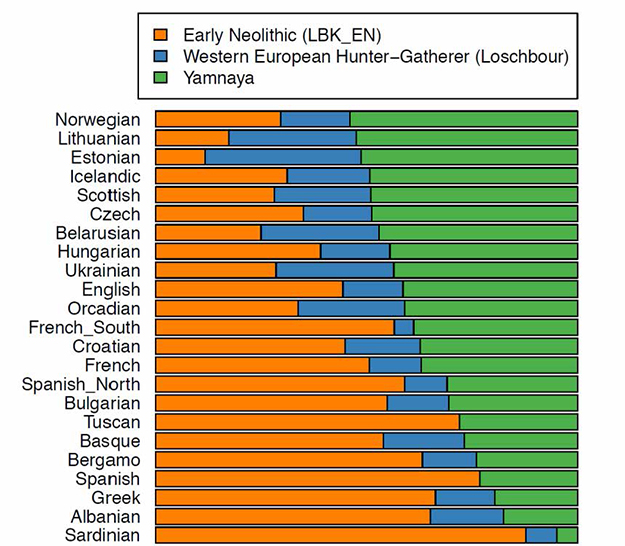
Allthough all Europeans are a mix of the three latter, to various degree, the change was far from peaceful (5).
Long distance, human travel
Here are a few, confirmed ones, prior Columbus:- polynesia to South America
- the silk road
- Vikings in the America’s
- closely related individuals has been found as far apart as Hungary and Mongolia during the Bronze Age (was unable to find the study, ref Reich).
- the aboriginal Australians, 50k years ago
- relatively modern explores (such has Heyerdahl) has shown that cross ocean travel was fairly straight foward with relative primitive tech
The younger dryas
Was an apologolypatic event; I quote from wiki:QuoteThe Younger Dryas (YD, Greenland Stadial GS-1)[2] was a period in Earth's geologic history that occurred circa 12,900 to 11,700 years Before Present (BP).[3] It is primarily known for the sudden or "abrupt" cooling in the Northern Hemisphere, when the North Atlantic Ocean cooled and annual air temperatures decreased by ~3 °C (5.4 °F) over North America, 2–6 °C (3.6–10.8 °F) in Europe and up to 10 °C (18 °F) in Greenland, in a few decades.[4] Cooling in Greenland was particularly rapid, taking place over just 3 years or less.[1][5] At the same time, the Southern Hemisphere experienced warming.[4][6] This period ended as rapidly as it began, with dramatic warming over ~50 years, which transitioned the Earth from the glacial Pleistocene epoch into the current Holocene.[1]
This coincides with to extremely interesting events: goebekli Tepe and Plato’s date for Atlantis. Goebleki tepe was deliberately buried. Before this, there has been found zero, recognized evidence of civilization.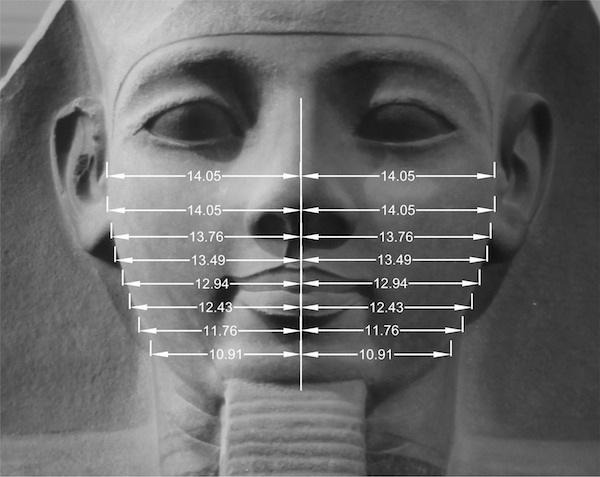
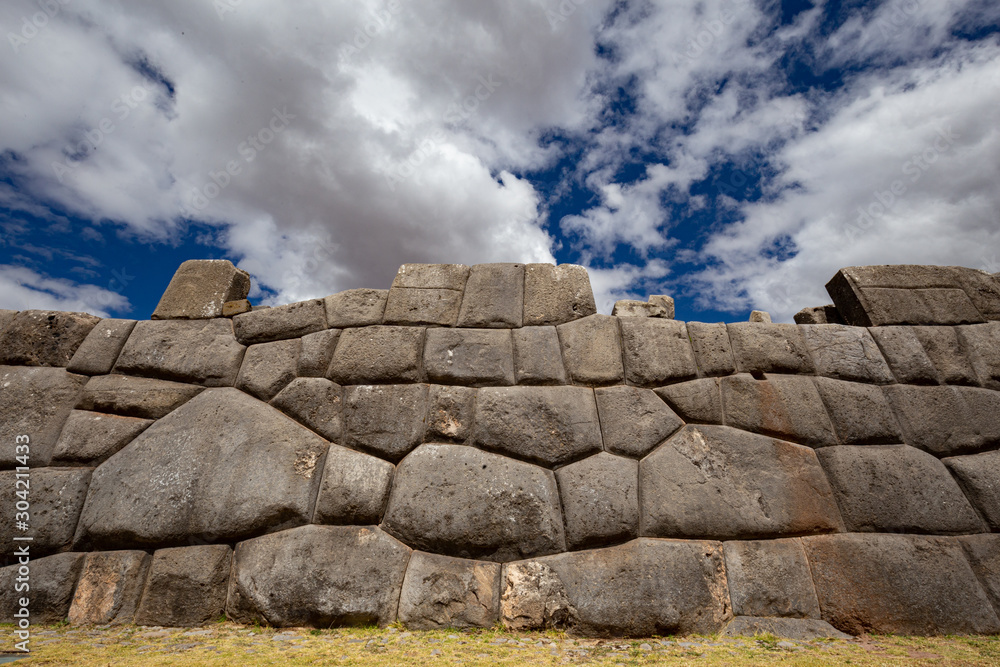
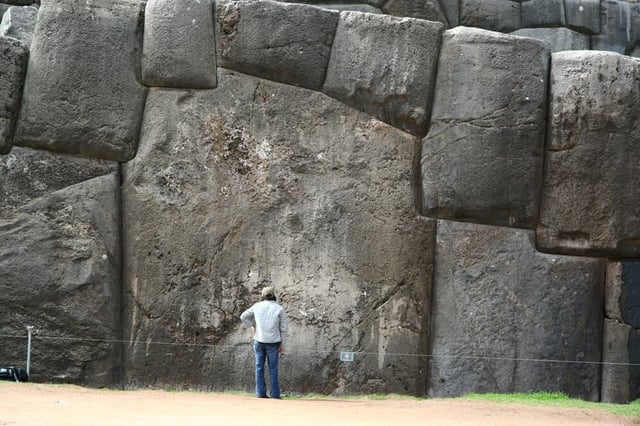
So… is it time to reconsider the standard narrative?
Facts, legend and narrative
My argument goes along the lines of this: weather it is based on fact or not, humans put them into a narrative regardless. Let’s take the foundation stories of Norway, the US and Israel. They all probally contain some degree of truth, and a lot of exaggeration. But does it really matter whether Harald Fairhair got rejected by a woman who didn’t want to marry a petty king, so he decided to not cut his hair until he united all of Norway? To me it doesn’t.
Further more, I believe myth and stories contain a lot of truth in a deeper sense.
(1) https://www.science.org/content/article/how-neanderthals-lost-their-y-chromosome(2)
(3) https://www.sciencenews.org/article/first-settlers-reached-americas-130000-years-ago-study-claims
(4)
https://pmc.ncbi.nlm.nih.gov/articles/PMC7015685/
(5)
https://sciencenews.dk/en/100-ancient-skeletons-reveal-dramatic-turnover-of-denmarks-population
-
3 hours ago, NorthWide said:I have great respect for the Danes as they are generally clear-cut and forthcoming.
I see that as their greatest strength as they generally are not cowards. Being a coward is also worthy of death in Christianity.
I studied the mythology, eddas and Havamal for a long time.
I called it as I saw it, you called it as you saw it.
If you wish, I will continue to discuss Mythology.
Sure we can, anything on your mind? A few topics that fascinates me, proto indo euro, comparative and pagan influences on Christianity. But these are huge and though questions.
We should prob make another thread tho, so make one about whatever you’d like to discuss and I’ll see if I got something to contribute.
-
My friend, I welcome you to try a year in Norway and you’ll know for sure that it does ahhaha.
-
 3
3
-
-
3 hours ago, Nungali said:The above seems a very strange story
I mean, all old stories which we have lost the cultural connection to sound weirds.
-
3 hours ago, Nungali said:The Man IN the Moon
Probally. We say mannen PÅ (on) the moon tho. I believe there is a unique Germanic version of this as well, due to the phrase being so common in these languages (as well as how well it flows), all though I am aware it exists elsewhere as well.
-
1 hour ago, NorthWide said:It says:
I was under the impression it was Loki, due to his bindings and imprisonment... Odin being underrepresented. Dawkins's concession, due to it being his concession, will be allowed.. Last line is old Norse: Northmann here held wide is 'the army of the north tent spread wide'.
1. åkerspenna, Norway, approx 500 ad
2. Sutton hop helmet, England
3 finnestorp buckle, ca 500 sweden
4. first artifact with the word Odin engraved on it, Denmark
5. somewhere in England
6. beserker, Sweden
All these are asscociated with Odin due to the ravens, the beserker theme and and one eyed ness on the helmet, Odin sacrificing his eye and again, the beserker/wild hunt theme. Also, Odin is also accosiated with spears. Odin is also known as the hanged god, or god of the hanged, and likewise hanged from a tree:
Odin's Quest after the Runes (havamal)
137.
I trow I hung on that windy Tree
nine whole days and nights,
stabbed with a spear, offered to Odin,
myself to mine own self given,
high on that Tree of which none hath heard
from what roots it rises to heaven.138.
None refreshed me ever with food or drink,
I peered right down in the deep;
crying aloud I lifted the Runes
then back I fell from thence.Consider the facial similarities.
Where are you based? The danish show gåten om Odin (the enigma of Odin) is available at both DR as well as NRK, and id assume SVT as well. Its pretty good.
-
3 minutes ago, NorthWide said:ᛁ ᚹᚨᛊ ᚢᚾᛞᛖᚱ ᚦᛖ ᛁᛗᛈᚱᛖᛊᛊᛟᚾ ᚦᚨᛏ ᛁᛏ ᚹᚨᛊ ᛚᛟᚲᛁ, ᛞᚢᛖ ᛏᛟ ᛚᛟᚲᛁ×ᛊ ᛁᛗᛈᚱᛁᛊᛟᚾᛗᛖᚾᛏ ᚨᚾᛞ ᛟᛞᛁᚾ ᛚᚨᚱᚷᛖᛚᛁ ᛒᛖᛁᛜ ᚢᚾᛞᛖᚱᚱᛖᛈᚱᛖᛊᛖᚾᛏᛖᛞ. ᛗᛁᛊᛏᛖᚱ ᛞᚨᚹᚲᛁᚾᛊ× ᚲᛟᚾᚲᛖᛊᛊᛟᚾ ᚹᛁᛚᛚ ᛒᛖ ᚨᛚᛚᛟᚹᛖᛞ. ᚾᛟᚱᚦᛗᚨᚾᚾ ᚺᛖᚱᛖ ᚺᛖᛚᛞ ᚹᛁᛞᛖ.
You know, the futhark fell out of use around a millennia ago, mind helping me out?
-
I find it interesting. Don’t know about you guys, but would a thread sharing finds be of interest?
Disturbing find in Bronze Age britain
https://www-vg-no.translate.goog/nyheter/i/93G62E/grotesk-funn-fra-bronsealderen-i-britisk-massegrav?_x_tr_sl=no&_x_tr_tl=en&_x_tr_hl=no&_x_tr_pto=wappthis was published today. I doesn’t provide a lot of information, but I wonder if it’s related to the arrival of the bell beakers, based on the timing.
A few others:
https://www-forskning-no.translate.goog/arkeologi-dna/nye-analyser-viser-at-ismannen-otzi-holdt-pa-a-bli-skallet-og-hadde-morkere-hud-enn-forskerne-trodde/2243804?_x_tr_sl=no&_x_tr_tl=en&_x_tr_hl=no&_x_tr_pto=wapp
New info on Ötzi the icemanBronze Age Scandinavian society linked to secret society:
https://www.rockartscandinavia.com/images/articles/a20chacon.pdf
Remarkable New Evidence for Human Activity in North America 130,000 Years Ago
-
 1
1
-
-
-
There is a lot of BS on YT, but also a lot of good. Here, I thought we could share some gold. Speaking for myself, it is my fav form of media. I’ll start with this one:
-
 1
1
-
-
2 minutes ago, Nungali said:WE do ? How so ?
I do. hallucinations.
-
The man on the moon is an interesting one. Anyone done any research?
-
@Sir Darius the Clairvoyent (or rather, Viggo Johansen)
SpoilerI think you’ll enjoy this. It is from foreword of Meditations, written by Viggo Johannesen:
So let's ask the question: Is there anything to being a human being?
Some might say no to that as well, arguing that being human is purely a socially constructed phenomenon. Regardless of what you believe personally, remember that science cannot help you here. On this point, science is as helpless as faith, it can only believe. Science assumes that man is a material phenomenon in a material world. Which is a decent assumption, but only an assumption. Even a metaphysical assumption. Completely without scientific evidence. As we all know, humans are conscious beings, and since science only recognises material phenomena as real, it is forced to assume that consciousness is something material. Humanity's wisdom traditions, on the other hand, have always spoken of spirit. Spirit is beyond time; it refers to that in man which belongs to eternity. This cannot be proven scientifically either, so we are left with ourselves and our own experience as the only witness to the truth.
Is it something to be a human being?
Where do you stand on this perhaps most fundamental question of them all? Have you made up your mind, and if so, on what basis?Translated with DeepL (https://www.deepl.com/app/?utm_source=ios&utm_medium=app&utm_campaign=share-translation)
Spoilerhere is this unity, and awareness of being that permeates this moment. This emptiness of separateness is the larger fabric from which all seemingly separate things arise. Humans are an epiphenomena of this emptiness, like all seemingly separate phenomena, including, but not limited to, gods, birds, cars, famine, chickens and Britney Spears. Are there humans, or any of the rest? Yes, of course, they have a provisional reality arising from the causes and conditions of the phenomenal world, but they do not have absolute reality. Only the simple awareness of being has absolute existence.
The absolute includes, but supercedes the relative. - Ken Wilber
Have you made up your mind, and if so, on what basis?
Yes. Persistent experiential understanding that has lasted over 9 years without changing or shifting.
SpoilerI find that all confusing ... of course it is 'something' to be a human being .
the passage seems to relate to materialism Vs spirituality . In either view it must mean 'something; to be a human being , one way or the other .
It looks like you are asking if the human being is purely a materialistic construct under the view of scientism ?
Spoiler… Is there anything to being a human being? … Humanity's wisdom traditions … have always spoken of spirit.
… Where do you stand on this perhaps most fundamental question of them all?
I have a soul.
Have you made up your mind …
Yes.
and if so, on what basis?
Because I feel like it.
So first of all, I shouldve been more clear. The foreword was as mentioned for meditations by Aurelius. But the context of that particular qoutation, was, can something written by the most powerfull man, 2000 years ago, be relevant to us today? Therefore the question of what it means to be human.
@stirling I agree with you
@Nungali Yes, it was also intented towards materilaism/mentalism. Or wheter the physical is a construct of mental, or visa versa. I feel quite convinced that the mental is primary. Reason being, we know that the mental can create appearantly physical phenoma, while we have no clue how a bunch of no concious cells can turn into a conciouss being.
Id like to open a third alternative tho. What if the world is neither physical nor mental, but that the physical and mental is fundementally the same substance?
-
I’ll check the book, but I’d like to know, what do you think this «whatever it is» is?
-
56 minutes ago, Nungali said:people are travelling through the forest , they come into an area that 'feels' different , it has an 'energy' and they feel charged or excited or 'prickly' ('goosebumps', hair 'standing on end ' ) a light appears in the sky and descends . It is like a glassy or watery sphere and a figure can vaguely be sen inside it . The strange feeling rises and then different things seem to happen to the different people witnessing . Later they 'come out of it ' and it seems for some there has been some 'lost' time or a time discrepancy .
You know what… reminds me of basically every fairytale im familiar with.
-
29 minutes ago, Nungali said:At one stage , aliens seemed very interested in our bottoms .
Haha yes, and it all took place in the no lands of America. «IM NOT GAY»
«Early account of Aboriginals observing a ship coming up the coast , exploring the 'new land ' .' We saw clouds at at sea, moving along (sails ) under them was an upturned shell, like an island , it had some trees on it (masts ) then a water insect came out of it and walked across the water ( a long boat with oars ) it came up onto the beach and men got out of it ! '»
This could throw a lot of light on many stories of old, I am sure. No particular comes to mind, but I’ll remember this
«Second, Harpur finds in all of this a profound insight into the nature of reality, and what it is to be human»
Is love to know
«Second, Harpur finds in all of this a profound insight into the nature of reality, and what it is to be human.»
I feel disturbed enough as it is. Im ready for being told that that dwarf I made love to in a lake was a prehistoric creature.
« With Jung, Harpur argues that these are phenomena of the psyche, but that psyche is of the world, not just of us as individuals.»
Familiar with sheldrake and morphic ressonance? https://www.sheldrake.org/research/morphic-resonance/introduction
-
1 hour ago, stirling said:It does. Did not know about it.
-
 1
1
-
-
This is a big one. From your article: Cultural Christians are those who received Christian values or appreciate Christian culture.
It also states that you don’t need to either believe nor disbelieve in order to be one. My take is, there is no such thing.
First off: not even Christianity is purely Christian, but absorbed damn much from previous and contemporary cultures. Why is paradise a land of milk and honey for a lactose intolerant people, for instance? Curious, don’t you think.
I think ideas like all being eqeul in the eyes of god and love your enemy, are both powerful, radical and fairly unique. Turn the other cheek is certainly a radical departure from Jewish scripture, which says an eye for an eye (which again can be traced back to Hammurabiat least). Maybe it can even be traced back to Adam and Eve. If you punch me, I punch you back. Sounds quite human, actually.
I read an interesting segment about how some of these universal Christian values might come from stoicism as well. I’ll post it when I get home, if your interested. But then you might as well ask, where does stoicism come from? And we could go way more controversial and discuss slave morality.
Further more, Christian beliefs varried way more at its start, then it does today. Which is the opposite of what you’d expect, really.
Marcion was a sentral figure in early Christianity. He believed that the Jewish/ot God was not only not the same as that of the Christian. He believed OT god was the literal devil. And no, that was not a fringe belief. It’s not even THAT fringe today.
Then we ofc have the canonization of the Bible. God only knows on what basis they determined what text came from the heavens and which came from the horned one. I think I am open to the idea that parts of it is divinely inspired, in some sense. But the editing, composing and canonization of it is with out a doubt in part… manipulation.
Another example. Muslims for instance, value Christ enourmusly, but don’t believe in all the things Christian’s do about him. So could they be considered a another version of Christianity, in a sense?When Christianity was sold to the Scandinavians, they where sold a completely different story than that of the modern bible. Jesus was presented a some sort of warrior king. Heaven resembled that of Valhalla. Hell was a land of ice and snow, just like the Norse hel, and the literal opposite of the christen hell.
As everywhere else Christianity is, it is also a mix of the original culture and the blicial faith. It’s not like Christins immediately became all holy and abandoned their old ways and stopped drinking. Not at all. Nowhere was this the case. Yet I am pretty sure they considered them self Christian, and probably also the «correct» type of christian.
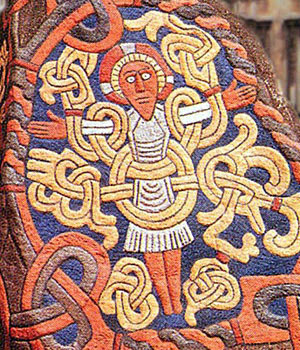
this is the jellingstone, and is a central part of the danish national narrative. It is even on their passport. With time it became known as Jesus at Jellingstone, but in all likely hood, it is actually Odin..
The thirty year wars is the bloodiest we in European history. It was fought between Protestants and the chatholics. That’s what I’ve been thought however, but very well might have been other interests at play as well. But think about that.
The pilgrims were considered extremist by the standards of medival England. My Christianity is not the same as that of my grandmother, nor of the Mormons.
Allthough we are all influenced by Christ…. I don’t think cultural Christianity is thing.
-
-
Perspectives on Time
Neil Oliver begins his book Wisdom of the Ancients by reflecting on the uncertainties of our modern world. He contrasts apocalyptic warnings of catastrophe with evidence of progress: fewer people in poverty, better living conditions, increased life expectancy, and groundbreaking advancements in medicine and technology. Yet, even with these achievements, peace of mind remains elusive. In search of wisdom, Oliver turns to the past, exploring how our ancestors perceived and navigated their world.
Similarly, the question of how time is understood—whether as a linear progression or as a recurring cycle—has shaped the worldviews of different cultures throughout history. Lets explore
The Greek View: Hesiod’s Ages of Man
Hesiod’s Works and Days presents one of the most detailed accounts of time as a sequence of ages, each with distinct characteristics and a gradual decline from an ideal past. Hesiod describes five ages:
-
The Golden Age: Ruled by Cronos, this was a time of perfect harmony and abundance. Humans lived without toil, suffering, or conflict. The earth provided its fruits freely, and death came gently, like sleep. After their deaths, the spirits of the Golden Age became guardians of humanity.
-
The Silver Age: This generation was less noble, characterized by immaturity and foolishness. Humans lived as children for a hundred years and showed no reverence for the gods. Zeus, angered by their impiety, ended their time.
-
The Bronze Age: A race of warriors arose, obsessed with violence and destruction. They were hard-hearted, used bronze for tools and weapons, and left no lasting legacy, as their lives ended in self-destruction.
-
The Heroic Age: A deviation from the pattern of decline, this age produced noble demigods who fought in legendary wars like Troy. After death, they were granted a special place in the Islands of the Blessed.
-
The Iron Age: Hesiod’s own era, marked by toil, strife, and moral decay. In this time, envy, dishonor, and injustice prevail, and Hesiod laments the loss of virtue and harmony.
This linear progression, from an idealized beginning to a degraded present, mirrors a sense of nostalgia and pessimism about humanity's trajectory. Hesiod’s narrative ends with a sense of inevitability: decline is unavoidable, and Zeus will eventually destroy even this race of men.
The Norse and Indian Cycles of Time
While the Greek conception of time in Hesiod's Works and Days is linear, the Norse and Indian traditions embrace a cyclical view of time, with the universe moving through repeating phases of creation, destruction, and renewal.
The Norse Perspective:
In Norse mythology, time begins with the creation of the world from Ymir’s body, but this harmony is temporary. Over time, chaos grows as Loki and his monstrous offspring bring strife to the gods and humanity. The world reaches its breaking point at Ragnarok, the apocalyptic battle where gods and mortals perish. However, Ragnarok is not the end. After the destruction, a new world emerges from the sea, green and fertile, and survivors live in peace. The cycle begins anew, symbolizing endless renewal.The Indian Yugas:
Indian cosmology divides time into four yugas, or ages, which form a repeating cycle:- Satya Yuga (Golden Age): A time of perfect virtue, harmony, and abundance.
- Treta Yuga (Silver Age): Moral and spiritual decline begins, and humanity must work to sustain itself.
- Dvapara Yuga (Bronze Age): Conflict, greed, and suffering grow.
- Kali Yuga (Iron Age): The current age, characterized by chaos, immorality, and decay.
At the end of Kali Yuga, the universe is destroyed and then recreated, beginning a new cycle with Satya Yuga. This cyclical understanding of time reflects a belief in eternal renewal and the inevitability of change, contrasting sharply with Hesiod’s finality.'
Shared Patterns Across Traditions
While the specifics differ, the Greek, Norse, and Indian traditions share remarkable similarities in how they describe the epochs of time:
-
The Ideal Beginning:
All three traditions start with a Golden Age: a time of peace, abundance, and harmony. In Hesiod's Works and Days, this is the era under Cronos, where humans lived like gods. In Norse mythology, it is the initial creation, where the gods live in peace and craft beautiful things from gold. In Indian tradition, it is the Satya Yuga, a time of perfect dharma (virtue). -
Gradual Decline:
Each tradition describes a process of degeneration. The Greeks move from the Golden to the Iron Age, marked by increasing toil and moral decay. Similarly, the Norse narrative shows harmony breaking down as chaos and conflict culminate in Ragnarok. In Indian cosmology, the yugas progress from Satya (virtue) to Kali (chaos). -
Violence and Strife in the Middle Ages:
The Bronze Age in Hesiod’s account, the later yugas in Indian tradition, and the Norse struggles against the jotnar all highlight a period dominated by violence, conflict, and a focus on martial prowess. These ages are transitional, setting the stage for ultimate destruction or renewal. -
The Apocalyptic End:
The Iron Age in Hesiod’s account aligns with the chaotic Kali Yuga and the Norse Ragnarok, all depicting a final collapse marked by greed, strife, and a loss of morality. -
Possibility of Renewal:
While the Greek tradition ends on a pessimistic note, both Norse and Indian cosmologies emphasize cyclical renewal. After Ragnarok, the Norse world is reborn, and after Kali Yuga, the Indian cosmos begins anew with Satya Yuga.
Here’s the continuation with the remaining sections translated into English:
Liberalism, Marxism, and Nationalism
The past two centuries have been marked by three major ideologies that have shaped societal development: liberalism, Marxism, and nationalism. While all three emerged from the challenges of modernity, they can be understood as reactions to one another—each attempting to address society's issues but from radically different perspectives.
Liberalism arose during the Enlightenment with a focus on individual freedom, rights, and property. Inspired by thinkers like John Locke and Adam Smith, it became the foundation of modern democracy and capitalism. Through market economies and rational institutions, society was envisioned as progressing linearly toward greater liberty and prosperity.
However, the massive social inequalities of industrialization revealed liberalism’s limitations. The working class was marginalized, and many felt alienated in a system that rewarded the privileged. This created room for a powerful critique of liberalism, led by Karl Marx.
Marxism was developed as a direct reaction to the ideals of liberalism. Marx argued that the "free" market economy and individual liberty were illusions because capitalism reduced workers to commodities in a system that served the wealthy. Where liberalism celebrated individual rights, Marxism claimed these masked class oppression.
For Marx, history was a process driven by class struggle. The goal was a radical transformation of society—a classless community where the means of production were collectively owned. Marxism rejected liberalism’s belief in gradual progress and called for revolution as the path to liberation. At the same time, Marx’s vision of international class struggle stood in contrast to a third emerging ideology: nationalism.
Nationalism, which developed alongside liberalism and Marxism, offered a different response to the challenges of modernity. While liberalism emphasized the individual and Marxism focused on international solidarity, nationalism placed the nation at the center—a community built on shared language, culture, and history.
Nationalism was a reaction against liberalism’s global market and Marxism’s universalism. It provided a collective identity in a time when many experienced fragmentation and rootlessness. Through struggles for national independence and cultural revival, nationalism became a powerful political force but also a source of conflict.
A Life Governed by the Clock
The introduction of mechanical clocks, Greenwich Mean Time (GMT), and the practice of punctuality marked a dramatic shift from traditional understandings of time. In older societies, time was tied to the rhythms of nature—sunrise, noon, and sunset dictated work and rest. For farmers in Norway, expressions like "sun in the eyes" and "sun behind the mountain" served as practical markers of the day’s progress. Similarly, medieval churches used the ringing of bells to signal prayer times, still aligned with daylight cycles.
In the 14th century, mechanical clocks began to break this connection by introducing a uniform division of time. Church bells regulated daily life in cities, and in monasteries, time was strictly measured by scheduled chimes. This abstract, mechanical understanding of time became a cornerstone of the Industrial Revolution, where factories required workers to adhere to precise schedules. Flexible work rhythms adapted to weather or seasons were replaced by rigid timetables. For many workers, alarm clocks—or in England, the curious profession of “knocker-uppers,” who tapped on windows to wake people—became symbols of a new and stricter time regime.
The need for coordination across distances culminated in the standardization of time. In the 19th century, GMT was established partly to ensure railways and trade operated seamlessly. Time, previously localized and tied to the sun’s position, was now globalized. Yet this standardization met resistance in many rural communities, where the abstract, uniform time system clashed with natural cycles.
This transition from an organic understanding of time to a mechanical one brought both opportunities and challenges. Mechanical clocks and GMT enabled global coordination and industrial advances, but they also replaced humanity’s natural rhythms with a uniform, strict time regime. Time, once adapted to life’s cycles, became a tool for control and efficiency—a change that continues to shape our modern relationship with the clock.
The State of Nature
The concept of the state of nature explores how humans related to one another before the establishment of societies, laws, and other constructs. For Thomas Hobbes, this state was marked by constant war, with human nature described as fundamentally brutal and selfish. In Leviathan, he famously characterized life in the state of nature as "solitary, poor, nasty, brutish, and short." To escape this chaotic condition, Hobbes argued that it was necessary to enter into a social contract and establish a strongly hierarchical and centralized societal structure.
In contrast, Jean-Jacques Rousseau believed that humans were naturally good, with an inherent ability to cooperate, living in harmony with each other and nature. This was a state marked by freedom and innocence, inspiring his slogan "back to nature!" Whether we align with Rousseau, Hobbes, or something in between, I believe our view of human nature—whether we are inherently "good" or "bad"—shapes how we think society should be organized.
David Graeber and David Wengrow’s The Dawn of Everything challenges these traditional dichotomies. They argue that early human societies were not confined to a single form of social organization. Instead, they experimented with various forms of governance, hierarchy, and social arrangements long before the advent of agriculture or the state. This diversity undermines the idea of a single "state of nature" from which modern societies evolved. The authors suggest that early humans had the creativity and freedom to choose how they organized their communities—an overlooked capacity in conventional narratives of human history.
In essence, they show that early humans were as diverse and complex as "us civilized folks" today.
Final Reflections

What am I trying to convey? It’s difficult to say. Maybe nothing. Maybe just that there are no definitive answers to how we should live. But I want to preserve and honour the histories, cultures, mysteries and people who have shaped us. And maybe looking to the past can be just as valuable as the future. This is an immense and complex topic, so my thoughts may feel scattered, and the language might not always flow perfectly. Instead of endlessly refining this, I’ll leave you with some art and quotations:
________________________________________________________________________________________________________________________________________________________________________________________________________________________________________________________________________
Spoiler
France, ca. 35.000bc. I have a copy on my wall.

Lion man, 40.000bc.

Cologne Cathedral, reaching towards the heavens
In the Roman era, elite citizens often honoured the death of a family member by creating idealised funerary masks. These "imagines" weren't usually buried with the deceased, but kept as memorials and stored in special niches in the family home – and even sometimes worn to other funerals by living family members.
Banana taped to wall
"A strange delusion possesses the working classes of the nations where capitalist civilization holds its sway. This delusion drags in its train the individual and social woes which for two centuries have tortured sad humanity. This delusion is the love of work, the furious passion for work, pushed even to the exhaustion of the vital force of the individual and his progeny. Instead of opposing this mental aberration, the priests, the economists and the moralists have cast a sacred halo over work. Blind and finite men, they have wished to be wiser than their God; weak and contemptible men, they have presumed to rehabilitate what their God had cursed. I, who do not profess to be a Christian, an economist or a moralist, I appeal from their judgement to that of their God; from the preachings of their religious, economics or free thought ethics, to the frightful consequences of work in capitalist society.
In capitalist society work is the cause of all intellectual degeneracy, of all organic deformity. Compare the thorough-bred in Rothschild’s stables, served by a retinue of bipeds, with the heavy brute of the Norman farms which plows the earth, carts the manure, hauls the crops. Look at the noble savage whom the missionaries of trade and the traders of religion have not yet corrupted with Christianity, syphilis and the dogma of work, and then look at our miserable slaves of machines. [1]
When, in our civilized Europe, we would find a trace of the native beauty of man, we must go seek it in the nations where economic prejudices have not vet uprooted the hatred of work. Spain, which, alas, is degenerating, may still boast of possessing fewer factories than we have of prisons and barracks; but the artist rejoices in his admiration of the hardy Andalusian, brown as his native chestnuts, straight and flexible as a steel rod; and the heart leaps at hearing the beggar, superbly draped in his ragged capa, parleying on terms of equality with the duke of Ossuna. For the Spaniard, in whom the primitive animal has not been atrophied, work is the worst sort of slavery. [2] The Greeks in their era of greatness had only contempt for work: their slaves alone were permitted to labor: the free man knew only exercises for the body and mind. And so it was in this era that men like Aristotle, Phidias, Aristophanes moved and breathed among the people; it was the time when a handful of heroes at Marathon crushed the hordes of Asia, soon to be subdued by Alexander. The philosophers of antiquity taught contempt for work, that degradation of the free man, the poets sang of idleness, that gift from the Gods:
O Melibae Deus nobis haec otia fecit.
Jesus, in his sermon on the Mount, preached idleness: “Consider the lilies of the field, how they grow: they toil not, neither do they spin: and yet I say unto you that even Solomon in all his glory was not arrayed like one of these.” Jehovah the bearded and angry god, gave his worshipers the supreme example of ideal laziness; after six days of work, he rests for all eternity."
The right to be lazy
«I have spent six years reflecting on the state of European society and I still can't think of a single way they act that is not inhuman, and I genuinely think this can only be the case as long as you stick to your distinctions of 'mine' and 'thine'. To imagine one can live in the country of money and preserve one's soul is like imagining one could preserve one's life at the bottom of a lake.»
Kondiaronk, Huron chief, 1600s
«They are really better to us, than we are to them;they always give us Victuals [6] at their Quarters [7], and take care we are arm'd against Hunger and Thirst: We do not so by them (generally speaking) but let them walk by our Doors Hungry, and do not often relieve them. We look upon them with Scorn and Disdain, and think them little better than Beasts in Humane Shape, though if well examined, we shall find that, for all our Religion and Education, we possess more Moral Deformities, and Evils than these Savages do, or are acquainted withal»
John Lawson's Assessment of the Tuscarora
[...] I find that there is nothing barbarous and savage in this nation, by anything that I can gather, excepting, that every one gives the title of barbarism to everything that is not in use in his own country. As, indeed, we have no other level of truth and reason than the example and idea of the opinions and customs of the place wherein we live: there is always the perfect religion, there the perfect government, there the most exact and accomplished usage of all things. They are savages at the same rate that we say fruits are wild, which nature produces of herself and by her own ordinary progress; whereas, in truth, we ought rather to call those wild whose natures we have changed by our artifice and diverted from the common order. In those, the genuine, most useful, and natural virtues and properties are vigorous and sprightly, which we have helped to degenerate in these, by accommodating them to the pleasure of our own corrupted palate. And yet for all this, our taste confesses a flavour and delicacy excellent even to emulation of the best of ours, in several fruits wherein those countries abound without art or culture. Neither is it reasonable that art should gain the pre-eminence of our great and powerful mother nature. We have so surcharged her with the additional ornaments and graces we have added to the beauty and riches of her own works by our inventions, that we have almost smothered her; yet in other places, where she shines in her own purity and proper lustre, she marvellously baffles and disgraces all our vain and frivolous attempts
Of Cannibals, Montaigne 1500s
The course of empire
Writing in the 1920s, Chadwick – Professor of Anglo-Saxon at Cambridge, at much the same time J. R. R. Tolkien held that post at Oxford – was initially concerned with why great traditions of epic poetry (Nordic sagas, the works of Homer, the Ramayana) always seemed to emerge among people in contact with and often employed by the urban civilizations of their day, but who ultimately rejected the values of those same civilizations. For a long time, his notion of ‘heroic societies’ fell into a certain disfavour: there was a widespread assumption that such societies did not really exist but were, like the society represented in Homer’s Iliad, retroactively reconstructed in epic literature. But as archaeologists have more recently discovered, there is a very real pattern of heroic burials, indicating in turn an emerging cultural emphasis on feasting, drinking, the beauty and fame of the individual male warrior. 80 And it appears time and again around the fringes of urban life, often in strikingly similar forms, over the course of the Eurasian Bronze Age. In searching for the common features of such ‘heroic societies’, we can find a fairly consistent list in precisely the traditions of epic poetry that Chadwick compared (in each region, the first written versions being much later in date than the heroic burials themselves, but shedding light on earlier customs). It’s a list which applies just as well, in most of its features, to the potlatch societies of the Northwest Coast or, for that matter, the Māori of New Zealand. All these cultures were aristocracies, without any centralized authority or principle of sovereignty (or, maybe, some largely symbolic, formal one). Instead of a single centre, we find numerous heroic figures competing fiercely with one another for retainers and slaves. ‘Politics’, in such societies, was composed of a history of personal debts of loyalty or vengeance between heroic individuals; all, moreover, focus on game-like contests as the primary business of ritual, indeed political, life.81 Often, massive amounts of loot or wealth were squandered, sacrificed or given away in such theatrical performances. Moreover, all such groups explicitly resisted certain features of nearby urban civilizations: above all, writing, for which they tended to substitute poets or priests who engaged in rote memorization or elaborate techniques of oral composition. Inside their own societies, at least, they also rejected commerce. Hence standardized currency, either in physical or credit forms, tended to be eschewed, with the focus instead on unique material treasures.
The dawn of everything


The recent discovery of a burial site in Vedbaek, Denmark has revealed a fascinating and heart-wrenching story from the distant past. This ancient grave, dating back approximately 7000 to 6000 years, serves as the final resting place of a young woman, estimated to be around 20 years old, and her newborn baby. The circumstances surrounding their demise tell a tale of tragedy, loss, and the profound connection between humans and the natural world
There's a boy, don't know what he's hidin'
He's got his mother's eyes and his daddy's charm
Just the right mix
And there's a girl, she knew where to find him
In the local bar, smokin' in the dark
It was perfect timingBut what they both didn't know
Is how far this thing would go
And they might not want the truth
But if they doPlay 'em our home movies
If they wonder who I was
Even if they don't
Then play 'em just because
Let 'em see the highlights
And don't forget the lows
Everybody's got a story no one knows
So just let 'em play until the credits rollThere's a story, I didn't know we'd write it
However long it took, it's an open book
If you love surprises
There's a song underneath the silence
You can hear the crowd sing the words out loud
In just the right pitchBut what we both didn't know
Was how far this thing would go
And we might not make it through
But if we doPlay 'em our home movies
If they wonder who I was
Even if they don't
Then play 'em just because
Let 'em see the highlights
And don't forget the lows
Everybody's got a story no one knows
So just let 'em play until the credits rollThere's nothing I could be without these memories
Even though they might not show the best of me (oh-oh)Play 'em our home movies
If they wonder who I was
Even if they don't
Then play 'em just because (play 'em just because)
Let 'em see the highlights
And don't forget the lows
Everybody's got a story no one knows (no one knows)
So just let 'em play until the credits roll -
-
Thats fine Daniel. I dont need an ignore list. I just have a quick laugh and move on.
Curious thing, your oppsession with the ignore function and telling people who you ignore. Even telling th e people you suppousedly ignore that you ignore them, multiple times!
Want to hear a funny little story? Ibn Fadlan was an learned muslim fellow. Once he encountered the norse somewhere along the volga river. Shortly after, their leader died, and a grand funeral lasting for mounth took place.
21. The next of kin to the deceased man now drew near, and taking a piece of wood, lit it and walked backwards toward the ship. He held the stick in one hand while the other shielded his buttocks, as he was naked. He held the stick until the wood which was piled under the ship took fire. Then the others came up with staves and firewood, each one carrying a stick already lit at the upper end, and all threw them on to the [funeral] pyre. The pile was soon aflame, then the ship, and finally the tent, the man, the girl, and everything else on the ship. A terrible storm began to blow up, and thus intensified the flames, and gave wings to the blaze.
Whats going on here, you might think. Understably so, because it does seem a little bizarre. Anyway, lets explore.
You have two ears, two nostrils, one mouth and one butt. (well, you have two mounths, no ears and multpiple butts, but thats beide the point). These are all hole, in a sense. They were under the belief that unwanted spirits (or lunatics) might enter their body trough these holes, when they left their body. By walking backwards, you cover all of them except one, the butt. So what does the man do? He shields it with his hand

-
 1
1
-

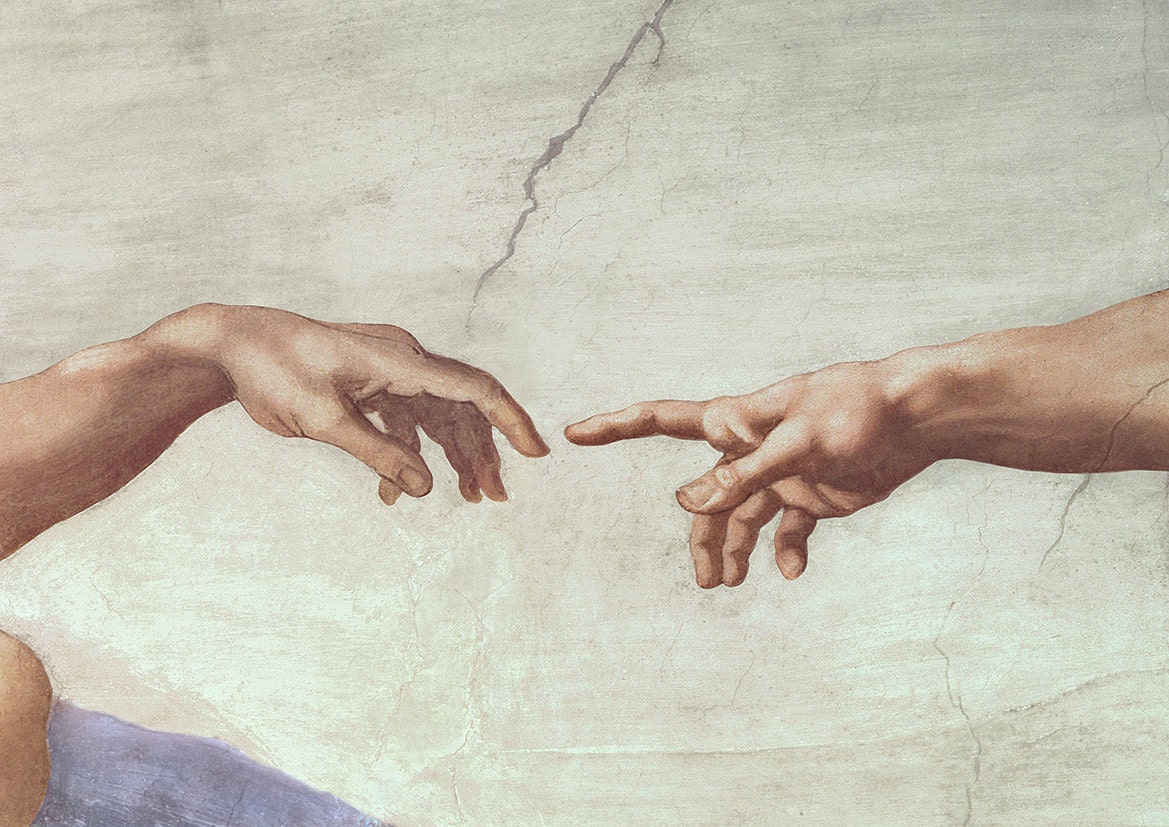
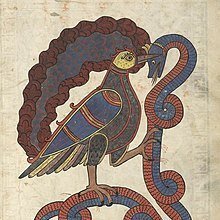



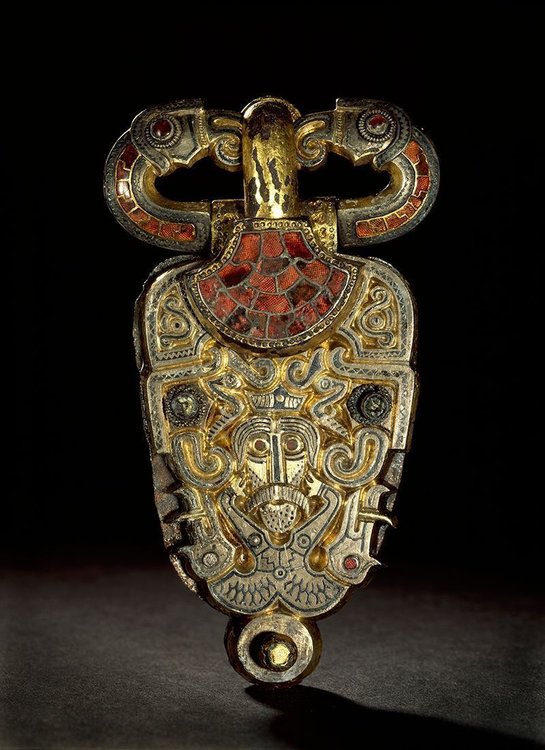
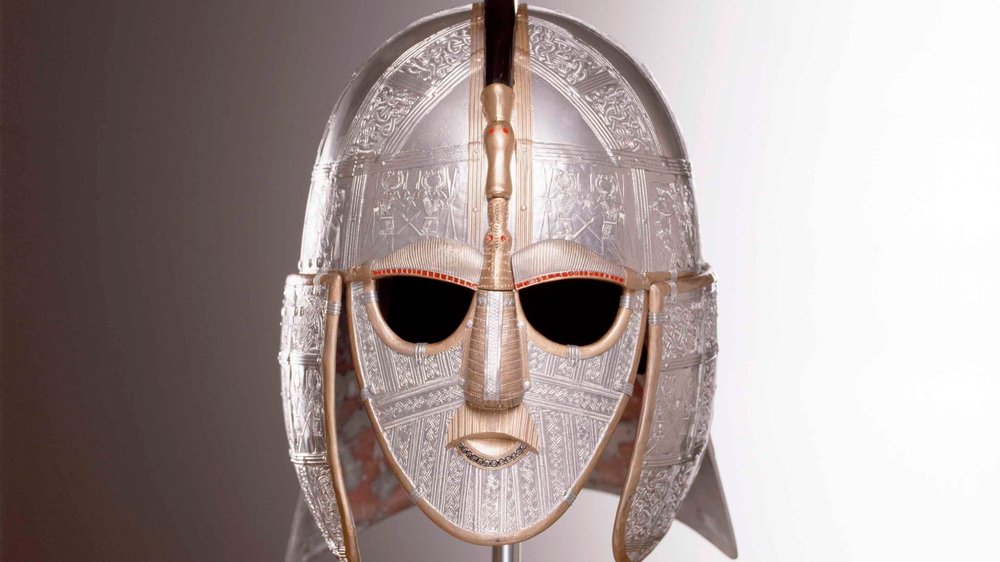
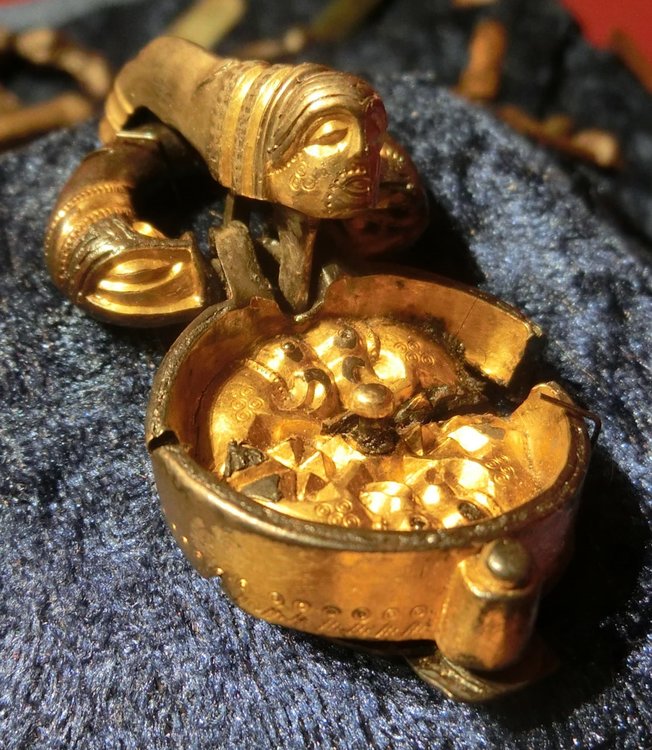
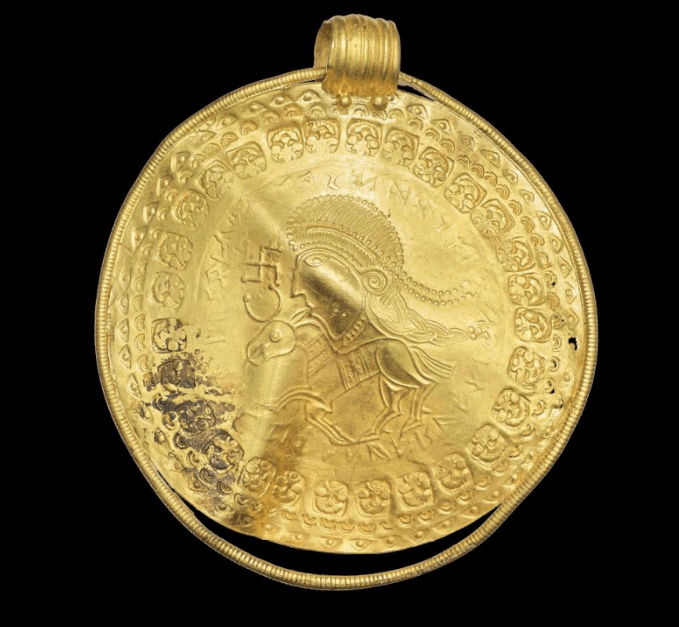
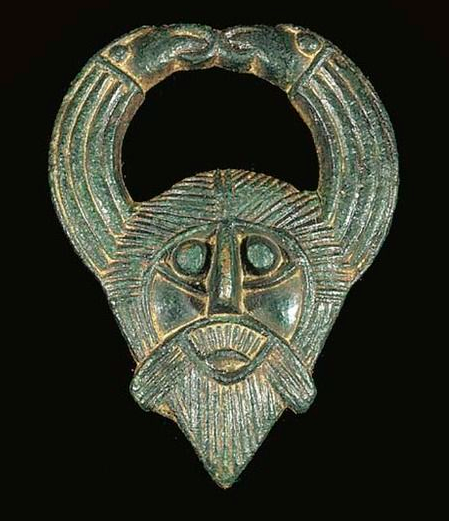
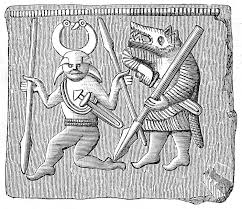
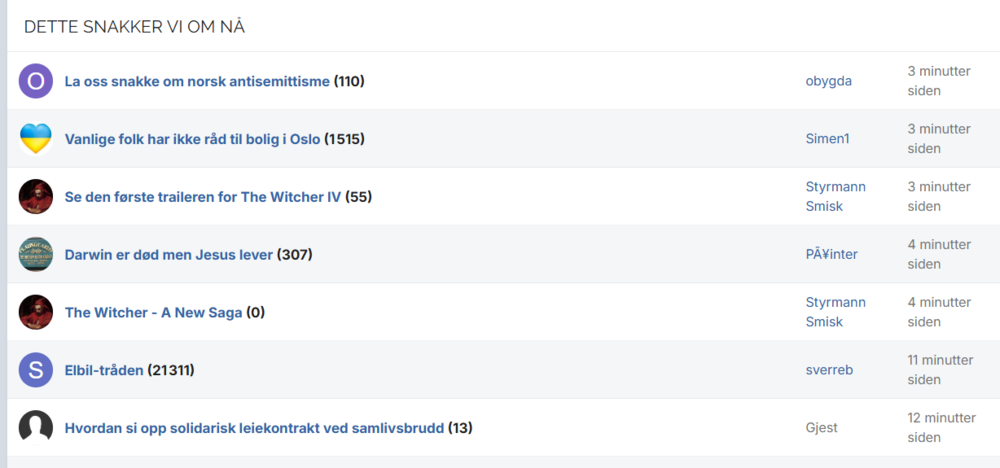

Archeology
in The Rabbit Hole
Posted
One heartbreaking one:
One for the mesoamericans:
Archaeologists have uncovered a 4,000-year-old network of earthen canals in present-day Belize, shedding light on the early inhabitants of the Yucatán Peninsula who preceded the ancient Maya civilization.
https://www-vg-no.translate.goog/nyheter/i/B0zno9/arkeologer-har-oppdaget-4000-aar-gamle-fiskekanaler-i-mellom-amerika?_x_tr_sl=no&_x_tr_tl=en&_x_tr_hl=no&_x_tr_pto=wapp
And one closer to home:
“Bronze Age and Viking Age societies in the Nordic countries were very similar,” Kristiansen says. The most striking resemblance was that both were maritime societies.
https://www.sciencenorway.no/archaeology-bronze-age-ships/was-there-a-viking-age-in-norway-2000-years-before-the-vikings/1698522